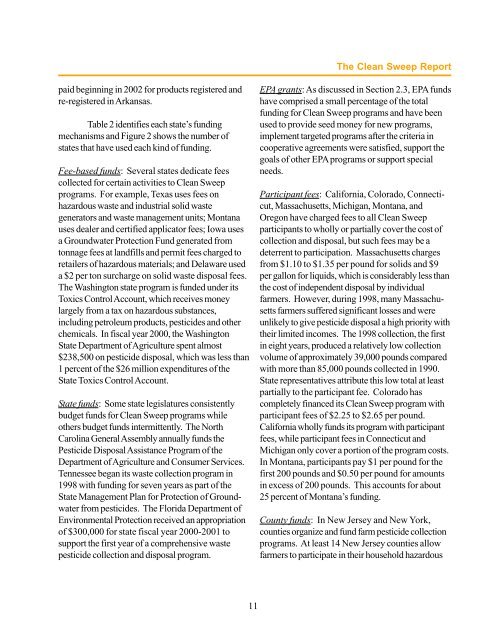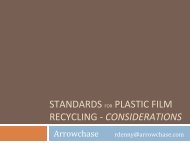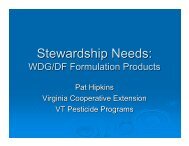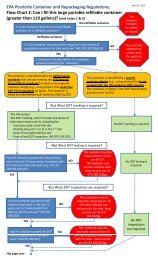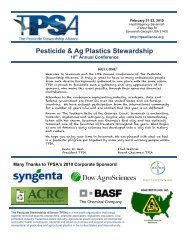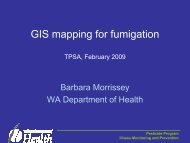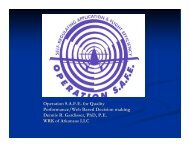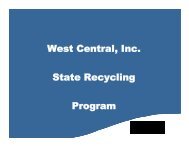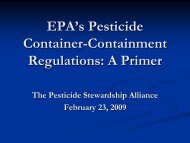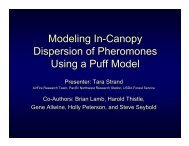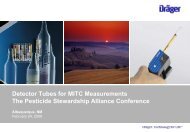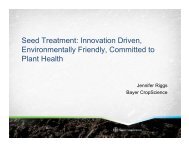Clean Sweep Programs - US Environmental Protection Agency
Clean Sweep Programs - US Environmental Protection Agency
Clean Sweep Programs - US Environmental Protection Agency
- No tags were found...
You also want an ePaper? Increase the reach of your titles
YUMPU automatically turns print PDFs into web optimized ePapers that Google loves.
The <strong>Clean</strong> <strong>Sweep</strong> Reportpaid beginning in 2002 for products registered andre-registered in Arkansas.Table 2 identifies each state’s fundingmechanisms and Figure 2 shows the number ofstates that have used each kind of funding.Fee-based funds: Several states dedicate feescollected for certain activities to <strong>Clean</strong> <strong>Sweep</strong>programs. For example, Texas uses fees onhazardous waste and industrial solid wastegenerators and waste management units; Montanauses dealer and certified applicator fees; Iowa usesa Groundwater <strong>Protection</strong> Fund generated fromtonnage fees at landfills and permit fees charged toretailers of hazardous materials; and Delaware useda $2 per ton surcharge on solid waste disposal fees.The Washington state program is funded under itsToxics Control Account, which receives moneylargely from a tax on hazardous substances,including petroleum products, pesticides and otherchemicals. In fiscal year 2000, the WashingtonState Department of Agriculture spent almost$238,500 on pesticide disposal, which was less than1 percent of the $26 million expenditures of theState Toxics Control Account.State funds: Some state legislatures consistentlybudget funds for <strong>Clean</strong> <strong>Sweep</strong> programs whileothers budget funds intermittently. The NorthCarolina General Assembly annually funds thePesticide Disposal Assistance Program of theDepartment of Agriculture and Consumer Services.Tennessee began its waste collection program in1998 with funding for seven years as part of theState Management Plan for <strong>Protection</strong> of Groundwaterfrom pesticides. The Florida Department of<strong>Environmental</strong> <strong>Protection</strong> received an appropriationof $300,000 for state fiscal year 2000-2001 tosupport the first year of a comprehensive wastepesticide collection and disposal program.EPA grants: As discussed in Section 2.3, EPA fundshave comprised a small percentage of the totalfunding for <strong>Clean</strong> <strong>Sweep</strong> programs and have beenused to provide seed money for new programs,implement targeted programs after the criteria incooperative agreements were satisfied, support thegoals of other EPA programs or support specialneeds.Participant fees: California, Colorado, Connecticut,Massachusetts, Michigan, Montana, andOregon have charged fees to all <strong>Clean</strong> <strong>Sweep</strong>participants to wholly or partially cover the cost ofcollection and disposal, but such fees may be adeterrent to participation. Massachusetts chargesfrom $1.10 to $1.35 per pound for solids and $9per gallon for liquids, which is considerably less thanthe cost of independent disposal by individualfarmers. However, during 1998, many Massachusettsfarmers suffered significant losses and wereunlikely to give pesticide disposal a high priority withtheir limited incomes. The 1998 collection, the firstin eight years, produced a relatively low collectionvolume of approximately 39,000 pounds comparedwith more than 85,000 pounds collected in 1990.State representatives attribute this low total at leastpartially to the participant fee. Colorado hascompletely financed its <strong>Clean</strong> <strong>Sweep</strong> program withparticipant fees of $2.25 to $2.65 per pound.California wholly funds its program with participantfees, while participant fees in Connecticut andMichigan only cover a portion of the program costs.In Montana, participants pay $1 per pound for thefirst 200 pounds and $0.50 per pound for amountsin excess of 200 pounds. This accounts for about25 percent of Montana’s funding.County funds: In New Jersey and New York,counties organize and fund farm pesticide collectionprograms. At least 14 New Jersey counties allowfarmers to participate in their household hazardous11


